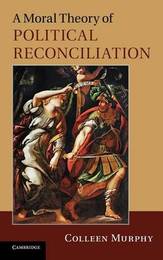
|
A Moral Theory of Political Reconciliation
Hardback
Main Details
| Title |
A Moral Theory of Political Reconciliation
|
| Authors and Contributors |
By (author) Colleen Murphy
|
| Physical Properties |
| Format:Hardback | | Pages:224 | | Dimensions(mm): Height 229,Width 152 |
|
| Category/Genre | Ethics and moral philosophy
Social and political philosophy |
|---|
| ISBN/Barcode |
9780521193924
|
| Classifications | Dewey:303.6 |
|---|
| Audience | | Professional & Vocational | |
|---|
|
Publishing Details |
| Publisher |
Cambridge University Press
|
| Imprint |
Cambridge University Press
|
| Publication Date |
7 October 2010 |
| Publication Country |
United Kingdom
|
Description
Following extended periods of conflict or repression, political reconciliation is indispensable to the establishment or restoration of democratic relationships and critical to the pursuit of peacemaking globally. In this book, Colleen Murphy offers an innovative analysis of the moral problems plaguing political relationships under the strain of civil conflict and repression. Focusing on the unique moral damage that attends the deterioration of political relationships, Murphy identifies the precise kinds of repair and transformation that processes of political reconciliation ought to promote. Building on this analysis, she proposes a normative model of political relationships. A Moral Theory of Political Reconciliation delivers an original account of the failure and restoration of political relationships, which will be of interest to philosophers, social scientists, legal scholars, policy analysts, and all those who are interested in transitional justice, global politics, and democracy.
Author Biography
Colleen Murphy is an Associate Professor of Philosophy at the University of Illinois, Urbana-Champaign.
ReviewsReview of the hardback: 'What is needed for the reconstruction of political relationships in societies that have been torn apart by deadly conflicts? Colleen Murphy has answered this question in a path-breaking book that is essential reading for anyone concerned to understand the rule of law and the place of trust in our shared social lives.' Alasdair MacIntyre, University of Notre Dame Review of the hardback: 'A Moral Theory of Political Reconciliation is far and away the best treatment of political reconciliation in a growing literature on this hot topic. Murphy has mastered this literature, distilled it, and set it off against her own views, which, to my mind, are better than the extant views. I would single out her discussion of the concepts of reconciliation, rule of law, and trust, as especially meritorious; I learned an enormous amount from them. The book is a tour-de-force, setting out a new way to think of reconciliation and arguing at length against all of the major alternative approaches.' Larry May, Vanderbilt University
|